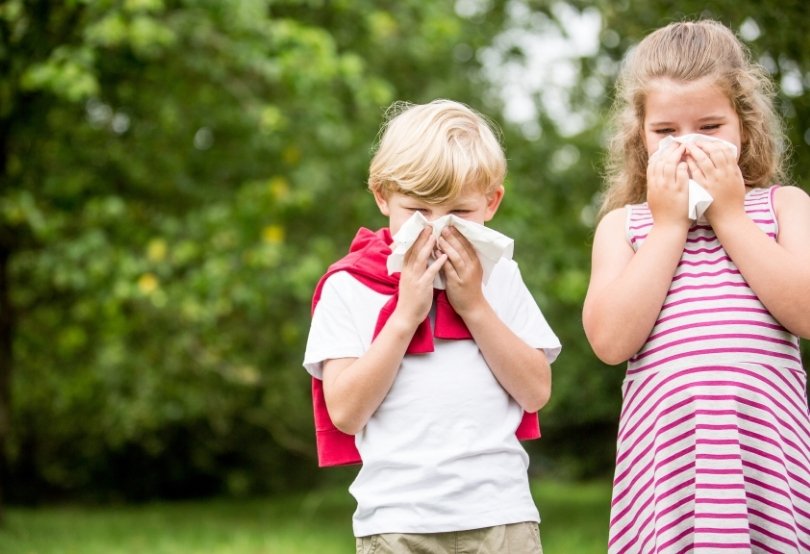
What is Bee Allergy?
Bee allergy is an allergic reaction to the venom injected by a bee sting. While most people experience mild symptoms like redness and swelling at the sting site, individuals with a bee allergy may have a more severe reaction known as anaphylaxis. Anaphylaxis is a potentially life-threatening condition that requires immediate medical attention. Bee allergies occur when the immune system overreacts to proteins in bee venom, causing a cascade of allergic responses.
Bee allergies are considered a form of insect venom allergy and can vary in severity from mild localized reactions to severe systemic responses.
What Causes Bee Allergy?
Bee allergies are caused by the immune system’s overreaction to bee venom. When a person with a bee allergy is stung by a bee, their immune system misidentifies the venom as a harmful substance and triggers the release of antibodies, such as Immunoglobulin E (IgE). These antibodies cause the body to release histamine and other chemicals that result in allergic symptoms.
Bee venom contains a variety of proteins that can affect immune cells and cause inflammation. For individuals with bee allergies, even a small amount of venom can trigger an exaggerated immune response, leading to symptoms ranging from mild discomfort to life-threatening anaphylaxis.
How to Understand Bee Allergy?
Understanding whether you have a bee allergy often begins with observing your reaction to a bee sting. While most people experience mild pain, swelling, and redness at the sting site, individuals with bee allergies may experience more severe symptoms, such as difficulty breathing, dizziness, or a rapid pulse. A severe reaction after a sting may indicate an allergy.
If you suspect you may have a bee allergy, it is important to consult an allergist. They can perform specific tests to determine whether you are allergic to bee venom and provide guidance on how to manage the allergy.
Bee Allergy Symptoms
The symptoms of a bee allergy can range from mild to severe, depending on the individual’s sensitivity to the venom. Common symptoms include:
– Pain, redness, and swelling at the sting site
– Itching or hives
– Difficulty breathing or wheezing
– Swelling of the face, lips, or throat (angioedema)
– Dizziness or fainting
– Rapid pulse or palpitations
– Nausea, vomiting, or diarrhea
In the most severe cases, bee stings can trigger anaphylaxis, which is a life-threatening condition that requires immediate medical intervention. Anaphylaxis symptoms include difficulty breathing, swelling of the throat and tongue, a drop in blood pressure, and loss of consciousness.
Bee Allergy Treatment
The treatment of bee allergies depends on the severity of the reaction. For mild reactions, over-the-counter pain relievers, antihistamines, and cold compresses may help alleviate symptoms. However, for severe reactions like anaphylaxis, immediate treatment with epinephrine (adrenaline) is required.
1- Epinephrine Auto-Injectors
Individuals with known bee allergies are often prescribed epinephrine auto-injectors, such as an EpiPen, which they should carry with them at all times. Epinephrine helps reverse the symptoms of anaphylaxis by opening airways, raising blood pressure, and reducing swelling.
2- Antihistamines
Antihistamines can help manage mild allergic symptoms like itching and hives after a bee sting. They work by blocking the effects of histamine, which is released during an allergic reaction.
3- Immunotherapy (Venom Desensitization)
Venom immunotherapy, also known as desensitization therapy, involves administering gradually increasing doses of bee venom to the patient over time. This treatment helps the immune system become less reactive to the venom, reducing the risk of severe allergic reactions in the future.
How to Test for Bee Allergy?
Testing for bee allergies typically involves a combination of a detailed medical history and specific allergy tests. Common tests include:
1- Skin Prick Test
During a skin prick test, a small amount of bee venom is applied to the skin, and the skin is pricked to allow the allergen to enter. If the patient is allergic to bee venom, a raised, red bump will appear at the test site within 15 to 20 minutes.
2- Blood Test
A blood test, such as the specific IgE test, measures the presence of antibodies that react to bee venom. Elevated levels of these antibodies suggest a bee allergy.
Bee Allergy Protection
For individuals with bee allergies, taking precautions to avoid bee stings is essential. Some protective measures include:
– **Wearing protective clothing:** Long sleeves, pants, and closed-toe shoes can help reduce the risk of being stung when spending time outdoors.
– **Avoiding scented products:** Bees are attracted to sweet-smelling perfumes, lotions, and hair products, so it’s best to avoid these when outside.
– **Staying calm:** If a bee approaches, avoid swatting at it. Instead, move away slowly and calmly.
If you are stung by a bee and have a known allergy, use your epinephrine auto-injector immediately and seek emergency medical care.
Bee Allergy Frequently Asked Questions
Can Bee Allergies Develop Over Time?
Yes, bee allergies can develop over time, especially after multiple stings. Some individuals who have never had an allergic reaction to a bee sting may suddenly develop an allergy after repeated exposure.
Can Bee Allergies Be Cured?
While there is no cure for bee allergies, venom immunotherapy can significantly reduce the risk of severe reactions by desensitizing the immune system to bee venom.
What Should I Do If I’m Stung by a Bee and Don’t Know If I’m Allergic?
If you’ve never had a severe reaction to a bee sting, monitor your symptoms closely after being stung. If you experience any signs of an allergic reaction, such as difficulty breathing, swelling of the face or throat, or dizziness, seek immediate medical attention. It’s also advisable to consult an allergist for testing if you’re concerned about a possible bee allergy.
Why Choose Us?
Our clinic specializes in allergies and allergy testing, and we stand out in the field of health tourism with the high standards of service we provide. Here are the key reasons why you should choose us:
Expert Doctor Team
At our clinic, we have highly experienced doctors at the professor level who are experts in the field of allergies. With years of experience in allergy treatment and testing, we provide the most accurate diagnosis and treatment processes. Our professor is skilled in managing even the most complex allergy cases and delivering the most effective solutions.
Cutting-Edge Allergy Tests
Your health is our top priority. In our clinic, we use state-of-the-art allergy testing technologies that are recognized globally. This allows us to obtain the most accurate and rapid results, ensuring that your treatment plans are created in the best possible way. Our tests are conducted according to international standards.
Comfort and Luxury Services
We don’t just focus on treatment; we also aim to provide a comfortable experience. During your treatment, we offer five-star hotel accommodations to ensure you feel at home throughout the process. Your comfort is guaranteed with the luxurious services we provide.
Transfer and Transportation Convenience
For patients coming from abroad or from other cities, we offer VIP transfer services. From the airport to our clinic, and from our clinic to your hotel, we are with you every step of the way. We take care of every detail to ensure your comfort and safety.
Personalized Approach
Every patient’s health condition is unique, and we tailor our solutions to meet each individual’s specific needs. Throughout your treatment process, we stay closely connected with you, and our professional team is by your side every step of the way.






